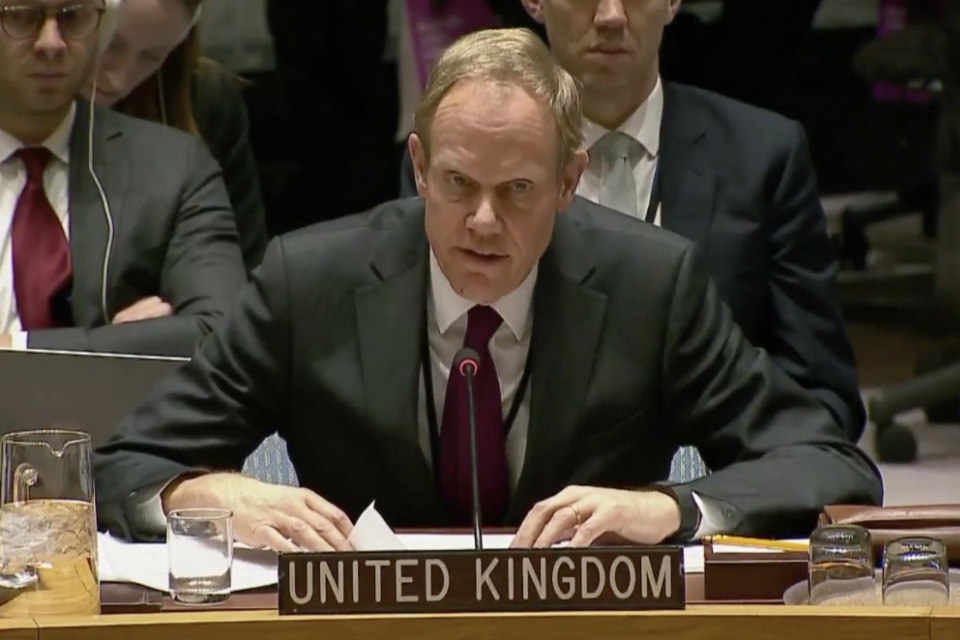"Let us not forget: A prosperous, stable Iran is beneficial us all, in the region and beyond"
Statement by Ambassador Matthew Rycroft, UK Permanent Representative to the UN, on the Situation in the Middle East.

Thank you Mr President, and welcome to the hot seat.
And thank you to our briefer Assistant Secretary General Zerihoun for the update on the situation in Iran.
And a very warm welcome to all the new Members of the Security Council. We look forward to working closely with all six of you to enhance international peace and security.
The United Kingdom is watching events in Iran very closely. We regret the loss of life that has occurred during the protests. We call for an end to the violence and for the Government of Iran to comply with its international human rights obligations in dealing with these protests.
There needs to be a meaningful debate about the legitimate and important issues that the protestors are raising. I note here that President Rouhani has said that the protesters’ concerns are legitimate and that they have a right to peaceful protest.
People should be able to exercise their right to freedom of expression and demonstrate peacefully and lawfully. We encourage the Iranian authorities to permit this.
No one is forcing Iran onto our agenda. The Security Council is perfectly empowered through Article 34 of the UN Charter, and I quote, “to investigate any dispute or any situation which might lead to international friction or give rise to a dispute in order to determine whether the continuance of the dispute or situation is likely to endanger the maintenance of international peace and security.”
The United Kingdom’s concerns about the human rights situation in Iran extend beyond the recent treatment of protestors. The continued use of the death penalty, including for juveniles, weak rule of law, restrictions on freedom of expression and freedom of religion or belief, are all deeply worrying.
We call on Iran to adhere to its international obligations to respect the rights of individuals to freedom of expression, opinion and peaceful assembly. We also urge Iran to permit full access to the Special Rapporteur so she can fully assess Iran’s actions on areas of concern.
At the same time Mr President it is important to recognise that Iran has legitimate security interests in the region. Iran suffered hugely in the Iran-Iraq war; we worked with Iran after 9-11. The Iranian people represent an ancient and important civilisation that has a rightful place in the modern world, with a modern economy. But too often Iran’s security interests are pursued in a way that destabilises – and at times directly threatens – others, supports terrorism and distorts the Iranian economy. These regional activities risk increasing international conflict and threaten international peace and security. We are deeply concerned by Iranian assistance to groups in Yemen, Lebanon, Syria and Iraq.
This includes reported transfers of Iranian ballistic missile parts and related technology to the Houthis in Yemen. Such transfers violate our Resolution 2231 which prohibits such transfers without the authorisation of the Security Council. They also violate our Resolution 2216 which prohibits the sale or transfer of arms and related materiel to the Houthis.
Houthi missile attacks in November and December targeted civilian areas. Had they landed as intended they would have caused suffering and chaos. And there are press reports even today of a new launch. This is unacceptable. We call on all member states to implement UN Security Council Resolutions and prevent such attacks, which increase regional tensions and threaten peace and security.
The transfer of weapons to the Houthis will also prolong the conflict in Yemen and the suffering of the Yemeni people. As I have said previously it is essential that the UN conducts a thorough investigation and informs the Security Council of its conclusions as soon as possible. We strongly support the Secretary-General’s call for a joint meeting of the 2140 Committee and the 2231 format. We look forward also to the Yemen Panel of Experts report this month.
The United Kingdom remains fully committed to the Joint Comprehensive Plan of Action. It is one of the international community’s greatest successes in recent memory. We welcome Iran’s compliance with its nuclear commitments. We encourage all Member States to uphold their commitments so the Iranian people see the tangible benefits of this deal.
We also encourage Iran to uphold its commitments, especially with respect to the provisions of Annex B as highlighted in the Secretary General’s fourth report as stipulated by Security Council Resolution 2231. Iran continues to invest heavily in ballistic missile development despite UN sanctions; we saw launches of ballistic missiles in 2016 and 2017 that were inconsistent with the Resolution. We urge Iran to refrain from such activity and ask all partners to report any evidence that Iran is conducting activity inconsistent with Resolution 2231 to the UN Security Council.
In conclusion, Mr President, let us not forget: A prosperous, stable Iran is beneficial us all, in the region and beyond. We will continue to encourage Iran to comply fully with Security Council Resolutions, to respect their citizens’ human rights, and to reduce regional tensions. This is the only way to achieve the peace and stability we all endeavour to achieve.
Thank you.